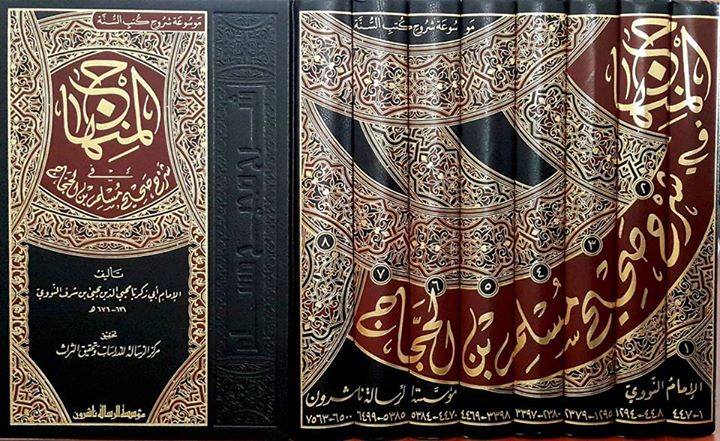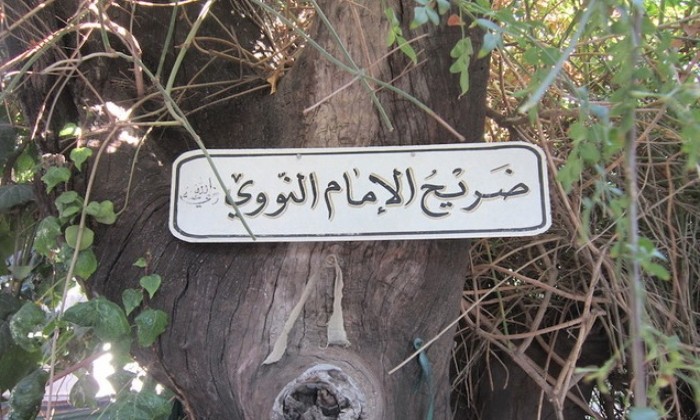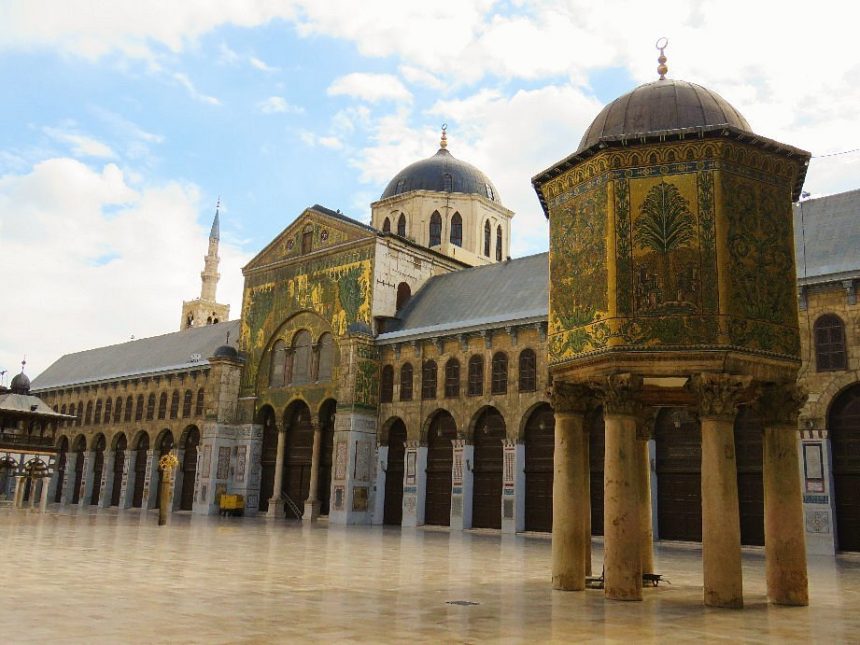Imam Nawawi is a name no scholar is unfamiliar with. Throughout the Islamic world, whenever the name of Imam Nawawi is mentioned, it is mentioned with reverence, honour and paying homage to an intellectual giant whose services to Islam are unparalleled. The following article aims to provide the reader with a brief overview of the life and times of the great imam, to serve as a motivation and an encouragement.
Birth and Early Life
He was (Imam) Yahya bin Sharaf, Abu Zakariyya al-Hizāmi al-Nawawi al-Ash’ari al-Shafi’ī. Born in the month of Muharram year 631 AH in his native hometown Nawā, which was located near Damascus. From a young age Allāh ta’ālā blessed him with great piety and a strong inclination towards the Deen.
A famous incident is recorded from his father,
“Once Yahya was sleeping besides me, his age at the time was seven years old. It was the 27th night of Ramadhan, half way through the night he woke up and asked. “Father what is this light that has filled the house!” I awoke along with my wife but we could not see anything.”
Imam Nawawi’s father mentioned that from this we understood that tonight was laylat al-Qadr (The Night of Power.)
Such a great feat, such a great manifestation given to a child of such a young age cannot be anything other than an indication from Allah, regarding the piety of this child and a glad tiding of his acceptance.
Studies
In the year 649 AH, Imam Nawawi moved to Damascus, where his father enrolled him into the Madrassah al-Rawāhiyyah. There, he would have lessons covering al-Wasīt, al-Muhaddhab, al-Jam’ bayn al-Sahīhayn, Sahīh Muslim, Al-Luma’ and numerous other books and sciences.
Imam Nawawi mentions regarding himself
“It occurred to me that I should involve myself in studying the art of healing and medicine. So I purchased the Al-Qanun. Darkness, shortly after, overcame my heart, and many days passed and I found myself being unable to busy myself with anything (studying etc.). I sold the book and my (previous state) returned to me.”
It is recorded that Imam Nawawi memorised the al-Tanbih in four and a half months, he memorised parts of the al-Muhaddhab the remainder of the year. He would have 12 lessons daily covering the books mentioned above.
Shuyukh
The following are a few of the teachers Imam Nawawi studied under;
1. Imam Kamāluddin Ishāq al-Maghribī 2. Imam Kamāluddin Sallār al-Irbilī
3. Shamsuddin Abdur Rahmān al-Maqdisī 4. Izzuddin Umar bin As’ad al-Irbilī
5. Abdur Rahman ibn Qudāmah al-Maqdisi (Hadith)
Students
Imam Nawawi also had many students who also went on to become notables. From amongst them were
1. Qādhi Sadruddin Sulayman al-Dārānī 2. Shaykh Alā-uddin Ali al-Attār
3. Hafiz Jāmaluddīn Yusuf al-Mizzī 4. Shaykh Muhammad al-Naqīb
And many more.
Books
Imam Nawawi lived a relatively short life. He passed away at 45 years of age, but this did not stop him from authoring many great works which became accepted throughout the centuries after his demise. Till this day his works are studied throughout the world and are used as a great assistance for scholars and laymen alike. From amongst his works are:
1. Al-Minhāj Sharh Sahīh Muslim 2. Riyādh al-Saliheen 3. Al-Adhkār
4. Al-Arbaīn 5. Al-Tibyān fi Adāb Hamalat al-Qur’ān 6. Al-Taqrīb
7. Al-Majmu’ Sharh al-Muhaddhab 8. Al-Irshād 9. Al-Manāsik
10. Tahdhib al-āsma wal-lughat

Praises of the ‘Ulama
It goes without saying, that Imam Nawawi was a great scholar, a pious ascetic, learned, God fearing and accomplished. He was a Hadith master and was given the title of Shaykh al-Islam of his time. He stood out bright amongst the other ‘Ulama of his time due to his asceticism and his scrupulousness in matters of Shari’ah.
Not only did he hold a high status and rank in his time, but even for those to come later he became a principal authority in the Shafi’i school.
Imam Dhahabi mentions: “He is the standard-bearer of the friends of Allah.”
Al-Marākishi narrates: “I saw the Shaykh Muhiyuddin in his village Nawa. He was 10 years old at the time and the children were forcing him to play with them, but he would run away from them crying (because of them forcing him) and he would be reciting the Qur’an. His love then entered into my heart.” He further mentions
“I spoke to his father and said to him, “it is hoped that this boy will go on to become the most knowledgeable of his time and the most ascetic.” So his father asked “are you a soothsayer?” and I replied “no, but Allah has made me utter this.”
Al-Isnawi mentions: “Imam Nawawi never married. He was one who would order good and prohibit from evil, he would face the kings and those below them with this.”
His student Alauddin ibn al-Attar mentions “some pious people saw in their dream that Imam Nawawi is a Qutub, and that the Shaykh warned people (from spreading this) and told them to keep silent on this.” (Allah knows best)
Regarding the demonym ‘al-Nawawi’, it comes from the name Nawa, which was the village in which he was born. Scholars often differ as to which pronunciation is correct, al-Nawawi (without the alif of madd) or al-Nawāwi (with the alif of madd). Imam Dhahabi mentions regarding this that the correct pronunciation is without the alif but it is permissible to read it with1
His Piety
Without a doubt Imam Nawawi was from amongst those Ulama who were also Zuhhād (Ascetics). Those who had shunned the Dunya and those upon it.
He was very meticulous with regards to what he would eat and where he would eat from. He would not accept gifts from anybody. He would only eat once in the day after Isha prayer and he would only have something to drink at the time of Suhoor which was sufficient for him. He would avoid eating moist foods such as fruit, in order to avoid drowsiness and sleep, as he was known to stay awake throughout the night.
Another quality mentioned regarding him is that he would ensure that none of his time was wasted. He would ensure that all of his time, day or night, be spent in studying or some sort of worship. Even whilst walking. He stayed upon this for 6 years, after which he started teaching and authoring books. As a result of him utilising his time and not wasting it, Allah would put barakah in his time and help him in his affairs.
His Death
Imam Nawawi passed away in the year 676 AH at 45 years of age. After having travelled to Bayt al-Maqdis, he returned to his hometown Nawā. There, he contracted an illness and passed away on the 24th of Rajab. His grave today is in the village Nawā and can still be visited (although there are reports that it was demolished by extremists).
[Maulana] Hanzala Khan

References:
1 See Tarīkh al-Islam of Imam Dhahabi,
Minhāj al-Talibīn , Dār al-Minhāj, First Edition
Sharh Riyadh al-Saliheen of Ibn Kamāl Pāshā, Dār al-Nawādir, First Edition
Al-Minhāj Sharh Sahih Muslim, Muassasah Qurtubah, Second Edition
Etiquette With The Quran


Leave a Reply